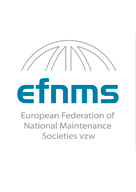
EFNMS - The European Federation of National Maintenance Societies
The EFNMS is a non-profit organization whose objectives is the improvement of maintenance for the benefit of the people in Europe. Maintenance is of great importance to trade and industry, to the environment, and to the public welfare and safety.
EFNMS celebrates its 50th anniversary in 2020
In 2020 EFNMS, the European Federation of National Maintenance Societies, celebrates its 50th anniversary. For this joyous occasion, EFNMS publishes a photobook with 24 inspiring pictures on maintenance & asset management. The photo book will illustrate the impact, added value and importance of maintenance.
The EFNMS booklet has been published on Issuu: https://issuu.com/bemas-belgianmaintenanceassociation/docs/efmns_50_years_issuu.
The Danish Maintenance Society (Den Danske Vedligeholdsforening - DDV) is the only professional Danish association for maintenance, reliability, and safety. DDV has maintained this unique status since being established in 1978.
At that time, maintenance experts from the Danish industry got together and agreed that there was a need to acquire and exchange knowledge about maintenance, reliability, and safety in a more systematic way and in an organized setting. This was the beginning of DDV.
Today, our vision is to be Denmark's primary meeting place for optimizing production and operations through better maintenance and higher reliability. We are constantly working towards this goal by a range of activities that enhance the professional maintenance abilities of our members.
The DDV motto “because maintenance is people” underlines the importance of the human factor in all aspects of maintenance. Therefore, knowledge sharing, and networking are part of our DNA. That way, our motto is reflected every time our members meet.
DDV has also developed the concept of 'value-creating maintenance' - and DDV is not only a place where members gather for network meetings and industry visits, but also a community where members can share knowledge directly with colleagues from all branches of industry.
The DDV 'house' has 4 pillars:
- Networking - we facilitate and inspire the use of Best Practice methods and processes
- Obtaining new professional knowledge - through collaboration with educational institutions
- Events and industry visits - across our professional networks
- Collaboration with relevant organizations - because exchange of knowledge creates synergy
As part of these efforts, we offer seminars and workshops that keep our members up to date with developments, new rules, and methods with regards to maintenance, reliability, and safety. We also take part in necessary dialogue with authorities when it concerns legislation and practices affecting our areas of interest.
Today, maintenance leadership is a more complex task than ever. Companies are competing in a challenging and globalized market. At the same time, technical complexity is increasing - with a higher degree of automation. In addition, there are increased requirements for production availability. Maintenance and reliability are expected to contribute to the overall company strategy, and investments in better maintenance are expected to turn cost into profit.
Technological development has now provided us with tools to predict when there is a need to take care of production equipment - so-called predictive maintenance. This development has also been called Maintenance 4.0 – as a parallel to Industry 4.0.
So, looking into the future of professional maintenance, reliability, and safety, we see some trends that will affect both our day-to-day tasks and our strategic planning:
- A fast growth in digitization and further technological complexity
- Increased sustainability – the global climate challenges will demand unseen sustainability efforts from the industry, which will also affect maintenance tasks.
- A larger contribution to the overall company strategy – with growing expectations that maintenance can be turned from cost into profit.
- Higher demands for operational robustness and readiness in the event of immediate challenges and threats – in the wake of the COVID19 pandemic
- A need for new skills among maintenance professionals – continuous education will be a must
Today, climate change and sustainability are at the top of the international agenda. How will this affect our work with maintenance and reliability? Of course, there will be gradual change of technologies and a move towards fossil-free energy. But all our maintenance and reliability efforts will have to align with and support the overall sustainability agenda.
On top of these huge challenges, we now also face the consequences of the COVID19 pandemic. This global threat has emphasized the need for much better risk assessment and the ability to keep operations running when global infrastructure breaks down. As part of this risk assessment, maintenance will be expected to contribute to increased operational readiness and robustness together with financial, operational, technical, and supply chain factors.
In other words, everyone working professionally with maintenance and reliability will experience an exciting and challenging future. International collaboration will be more important than ever …
Already in its first year, DDV became an EFNMS member in 1978. In 1980, DDV attended an EFNMS council meeting for the first time. The following year, the council meeting was held in Copenhagen, and in 1982 DDV participated in the EFNMS General Assembly for the first time.
Since then, DDV has been a committed member of EFNMS actively and continuously contributing to the European Federation of National Maintenance Societies.
In 1996, Euromaintenance 96 was held in Copenhagen. This was the 13th European Maintenance Conference and Fair held by EFNMS. The Danish contribution to EFNMS also includes the chairmanship of EFNMS from 2004-2007, when Hans Overgaard was chairman.
For over 40 years, DDV has contributed to all aspects of the EFNMS agendas, and we look forward to a close and rewarding European collaboration in the future.
